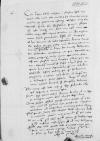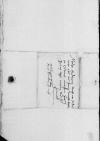 UUB, H. 154, f. 49r
UUB, H. 154, f. 49r
Cum ⌊Lipsim⌋ salvus rediissem, doctissime praesul, inter reliqua multa nova, quae amicis et his doctioribus communicanda mecum ex ⌊Germania⌋ inferiori attulissem, unica illa Dantisci ⌊⌋ fuit omnibus gratissima. Quod etiam author ipse esset plerisque tum fama tum re ipsa notus esse(?), vellem itaque adhuc aliquot exemplaria me adportasse, ut amicis singulis gratificarer. Epistola autem ⌊Campensis⌋ vobis(?) loco testimonii est habitae disputationis ⌊Lovanii⌋, tametsi illic medicis, ut rerum gestarum nomine facultatis testimonium darent plurimum prodesset superinscribed⌈plurimum prodessetplurimum prodesset superinscribed⌉, prodibit in lucem hoc semestri libellus morbum sudoralem[1] complectens, in quo disputationis et iudicii magnorum virorum mentio opportuna fiet. Mihi vero satisfecit unius ⌊Campensis⌋ iudicium, quem optarem disputationi interfuisse. Nihil reliquum fecisse me opinor binis meis disputationibus, quam me ridendum exhibuisse scholis medicorum, qui ego, homo barbarus peregrinus et indoctus, ausus fuerim cum doctissimis viris in celebratissimis studiis disserere, duxi tamen illud meum institutum honestius quam ⌊Brussellis⌋ balneare.
Rerum novarum nihil habeo, nisi quod ⌊rex Ferdinandus⌋ multa apud ⌊Bohemos⌋ et ⌊Moravos⌋ effecit.
Serenissimi ⌊regis⌋ ⌊Poloniae⌋ medicus ⌊Ioannes Benedicti⌋ ad me scripsit, quod intelligeret instrui bellum adversus ⌊regem⌋ ⌊Daciae⌋.
⌊Ducis Prussiae⌋ medicus expresse ad me scripsit, dominum et principem suum cum ⌊Polonis⌋ circa Penthecosten[2] ingressurum ⌊Walahiam⌋ ad ulciscendam iniuriam ⌊Polonis⌋ illatam.
Illusrissimo principi ⌊Ioanni Alberto marchioni⌋ libellum adversus ⌊Lutheri⌋ maledictia scriptum misi perlegendum quoque Gratiae Vestrae.
Si ego umquam Gratiae Vestrae Reverendae potero pro beneficiis acceptis gratias referre, nihil negligam, quod ad virum bonum pertinebit.
Reverenda Gratia Vestra parcat stilo et ineptiis meis, qui pene iam obruor negotiis. Valeat Gratia Vestra diu et feliciter.


 UUB, H. 154, f. 49v
UUB, H. 154, f. 49v